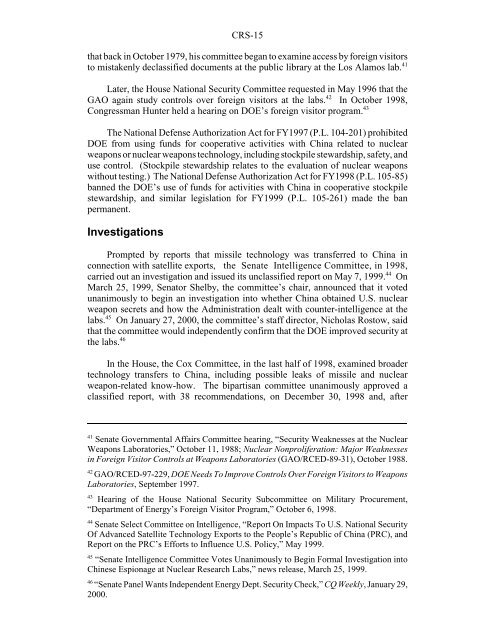China: Suspected Acquisition of U.S. Nuclear Weapon Secrets
China: Suspected Acquisition of U.S. Nuclear Weapon Secrets
China: Suspected Acquisition of U.S. Nuclear Weapon Secrets
Create successful ePaper yourself
Turn your PDF publications into a flip-book with our unique Google optimized e-Paper software.
CRS-15<br />
that back in October 1979, his committee began to examine access by foreign visitors<br />
to mistakenly declassified documents at the public library at the Los Alamos lab. 41<br />
Later, the House National Security Committee requested in May 1996 that the<br />
GAO again study controls over foreign visitors at the labs. 42 In October 1998,<br />
Congressman Hunter held a hearing on DOE’s foreign visitor program. 43<br />
The National Defense Authorization Act for FY1997 (P.L. 104-201) prohibited<br />
DOE from using funds for cooperative activities with <strong>China</strong> related to nuclear<br />
weapons or nuclear weapons technology, including stockpile stewardship, safety, and<br />
use control. (Stockpile stewardship relates to the evaluation <strong>of</strong> nuclear weapons<br />
without testing.) The National Defense Authorization Act for FY1998 (P.L. 105-85)<br />
banned the DOE’s use <strong>of</strong> funds for activities with <strong>China</strong> in cooperative stockpile<br />
stewardship, and similar legislation for FY1999 (P.L. 105-261) made the ban<br />
permanent.<br />
Investigations<br />
Prompted by reports that missile technology was transferred to <strong>China</strong> in<br />
connection with satellite exports, the Senate Intelligence Committee, in 1998,<br />
carried out an investigation and issued its unclassified report on May 7, 1999. 44 On<br />
March 25, 1999, Senator Shelby, the committee’s chair, announced that it voted<br />
unanimously to begin an investigation into whether <strong>China</strong> obtained U.S. nuclear<br />
weapon secrets and how the Administration dealt with counter-intelligence at the<br />
labs. 45 On January 27, 2000, the committee’s staff director, Nicholas Rostow, said<br />
that the committee would independently confirm that the DOE improved security at<br />
the labs. 46<br />
In the House, the Cox Committee, in the last half <strong>of</strong> 1998, examined broader<br />
technology transfers to <strong>China</strong>, including possible leaks <strong>of</strong> missile and nuclear<br />
weapon-related know-how. The bipartisan committee unanimously approved a<br />
classified report, with 38 recommendations, on December 30, 1998 and, after<br />
41 Senate Governmental Affairs Committee hearing, “Security Weaknesses at the <strong>Nuclear</strong><br />
<strong>Weapon</strong>s Laboratories,” October 11, 1988; <strong>Nuclear</strong> Nonproliferation: Major Weaknesses<br />
in Foreign Visitor Controls at <strong>Weapon</strong>s Laboratories (GAO/RCED-89-31), October 1988.<br />
42 GAO/RCED-97-229, DOE Needs To Improve Controls Over Foreign Visitors to <strong>Weapon</strong>s<br />
Laboratories, September 1997.<br />
43 Hearing <strong>of</strong> the House National Security Subcommittee on Military Procurement,<br />
“Department <strong>of</strong> Energy’s Foreign Visitor Program,” October 6, 1998.<br />
44 Senate Select Committee on Intelligence, “Report On Impacts To U.S. National Security<br />
Of Advanced Satellite Technology Exports to the People’s Republic <strong>of</strong> <strong>China</strong> (PRC), and<br />
Report on the PRC’s Efforts to Influence U.S. Policy,” May 1999.<br />
45 “Senate Intelligence Committee Votes Unanimously to Begin Formal Investigation into<br />
Chinese Espionage at <strong>Nuclear</strong> Research Labs,” news release, March 25, 1999.<br />
46 “Senate Panel Wants Independent Energy Dept. Security Check,” CQ Weekly, January 29,<br />
2000.
















